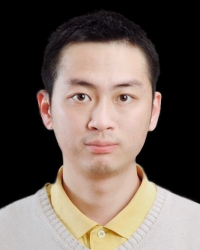Fan Yang Associate professor of Physics
Office: Room 340, Building 32
Email: fanyangphys@tju.edu.cn
Research Areas: Condensed Matter Experiment, Quantum Devices, Quantum Transport
Courses in Charge: Quantum Mechanics (undergraduate), Mesoscopic Physics and Nano-Devices (graduate)
Address: Yaguan Road 135, Jinnan District, 300350 Tianjin, P. R. China
Biographical Profile
Educational Background
2003 - 2007, B.Sc., Department of Physics, Nanjing University
2007 - 2012, Ph.D., The Institute of Physics, Chinese Academy of Sciences (Supervisor: Prof. Li LU)
Professional Career
2012.08 - 2015.10, Specially Apointed Researcher, The Institute of Scientific and Industrial Research, Osaka Univeristy, Japan
2015.11 - 2018.07, Postdoctual Researcher, Institute of Physics II, University of Cologne, Germany
2018.08 - Present, Associate Professor, Center for Joint Quantum Studies, Department of Physics, Tianjin University
Fields of Interest
Nano devices based on topological materials
Spintronic devices based on topological insulators
Unconventional superconductivity
Selected Publications
Journal Articles
# Equal contribution.
* Corresponding Authors
[1] Xiaocui Wang, Yang Yang, Yongkai Li, Guangtong Liu, Junxi Duan, Zhiwei Wang*, Li Lu, and Fan Yang*, Evidence of anisotropic three-dimensional weak localization in TiSe2 nanoflakes, Phys. Rev. B 112, 165204(2025).
[2] Ke Xu, Dengxin Ai, Changlong Sun, Yan Qi, Jiaojiao Wang, Fan Yang*, and Hechen Ren, Energies 18, 2627(2025).
[3] 杨阳,杨帆*, 电输运测量在拓扑量子材料研究中的应用, 物理 54, 320(2025).
[4] S. Chen#, Y. Yang[1] Kaixuan Fan, Ze Hua, Siyao Gu, Peng Zhu, Guangtong Liu, Hechen Ren, Ruiwen Shao*, Zhiwei Wang*, Li Lu, Fan Yang*, Materials 17, 5460(2024).
[5] Ke Xu, Yan Qi, Changlong Sun, Dengxin Ai, Jiaojiao Wang, Wenxue He, Fan Yang, Hechen Ren*, Entropy 26, 791(2024).
[6] L. Xu and F. Yang*, Chinese Phys. B 33, 027101(2024).
[7] S. Chen#, Y. Yang#, and F. Yang*, Chinese Physics B 31, 87303 (2022).
[8] X. Li, Y. Yang, X. Wang, P. Zhu, F. Qu, Z. Wang, and F. Yang*, Crystals 12, 773 (2022).
[9] S. Gu, K. Fan, Y. Yang, H. Wang, Y. Li, F. Qu, G. Liu, Z. Li, Z. Wang*, Y. Yao, J. Li, L. Lu, and F. Yang*, Phys. Rev. B 104, 115203 (2021).
[10] P. Zhu, Y. Li, X. Yang, Y. Yang, X. Zhang, X. Lin, F. Yang, X. Li, and Z. Wang, Crystals 11, 474 (2021).
[11] M. Bai#, F. Yang*#, M. Luysberg#, J. Feng, A. Bliesener, G. Lippertz, A. A. Taskin, J. Mayer, and Y. Ando*, Phys. Rev. Mater. 4, 94801 (2020).
[12] M. Pfeiffer, B. V. Senkovskiy, D. Haberer, F. R. Fischer, F. Yang, K. Meerholz, Y. Ando, A. Grüneis, and K. Lindfors, Nano Lett. 18, 7038 (2018).
[13] S. Ghatak#, O. Breunig#, F. Yang*#, Z. Wang, A. A. Taskin, and Y. Ando*, Nano Lett. 18, 5124 (2018).
[14] M. Pfeiffer, B. V. Senkovskiy, D. Haberer, F. R. Fischer, F. Yang, K. Meerholz, Y. Ando, A. Grüneis, and K. Lindfors, 2D Materials 5, 45006 (2018).
[15] A. A. Taskin, H. F. Legg, F. Yang, S. Sasaki, Y. Kanai, K. Matsumoto, A. Rosch, and Y. Ando, Nat. Comm. 8, 1340 (2017).
[16] F. Yang*, S. Ghatak, A. A. Taskin, K. Segawa, Y. Ando, M. Shiraishi, Y. Kanai, K. Matsumoto, A. Rosch, and Y. Ando*, Phys. Rev. B 94, 75304 (2016).
[17] F. Yang, A. A. Taskin, S. Sasaki, K. Segawa, Y. Ohno, K. Matsumoto, and Y. Ando, ACS nano 9, 4050 (2015).
[18] A. A. Taskin, F. Yang, S. Sasaki, K. Segawa, and Y. Ando, Phys. Rev. B 89, 121302 (2014).
[19] Y. Ando, T. Hamasaki, T. Kurokawa, K. Ichiba, F. Yang, M. Novak, S. Sasaki, K. Segawa, Y. Ando, and M. Shiraishi, Nano Lett. 14, 6226 (2014).
[20] F. Yang, A. A. Taskin, S. Sasaki, K. Segawa, Y. Ohno, K. Matsumoto, and Y. Ando, Appl. Phys. Lett. 104, 161614 (2014).
[21] F. Qu#, F. Yang#, J. Shen#, Y. Ding, J. Chen, Z. Ji, G. Liu, J. Fan, X. Jing, C. Yang, and L. Lu, Scientific Reports 2, 339(2012).
[22] F. Yang, Y. Ding, F. Qu, J. Shen, J. Chen, Z. Wei, Z. Ji, G. Liu, J. Fan, C. Yang, and L. Li, Phys. Rev. B 85, 104508 (2012).
[23] F. Yang, F. Qu, J. Shen, Y. Ding, J. Chen, Z. Ji, G. Liu, J. Fan, C. Yang, L. Fu, and L. Lu, Phys. Rev. B 86, 134504 (2012).
[24] F. Qu, F. Yang, J. Chen, J. Shen, Y. Ding, J. Lu, Y. Song, H. Yang, G. Liu, and J. Fan, Phys. Rev. Lett. 107, 16802 (2011).
[25] J. Chen, H. J. Qin, F. Yang, J. Liu, T. Guan, F. M. Qu, G. H. Zhang, J. R. Shi, X. C. Xie, C. L. Yang, K. H. Wu, Y. Q. Li, and L. Lu, Phys. Rev. Lett. 105, 176602 (2010).